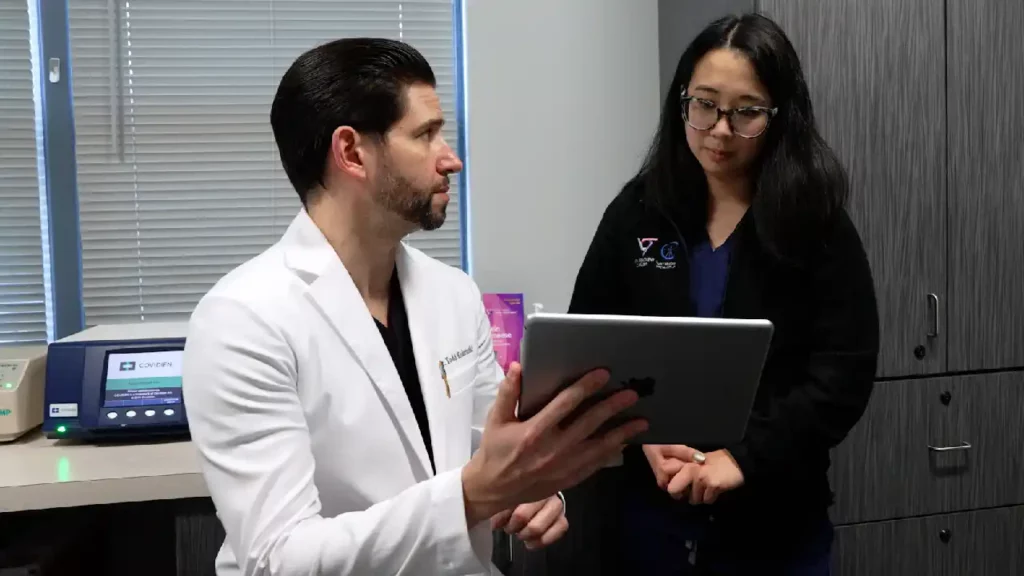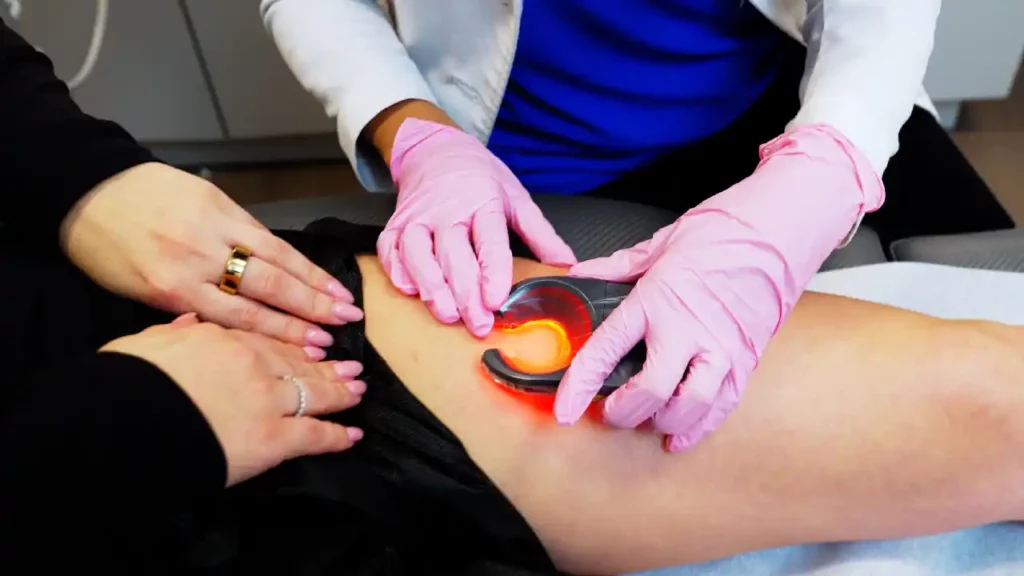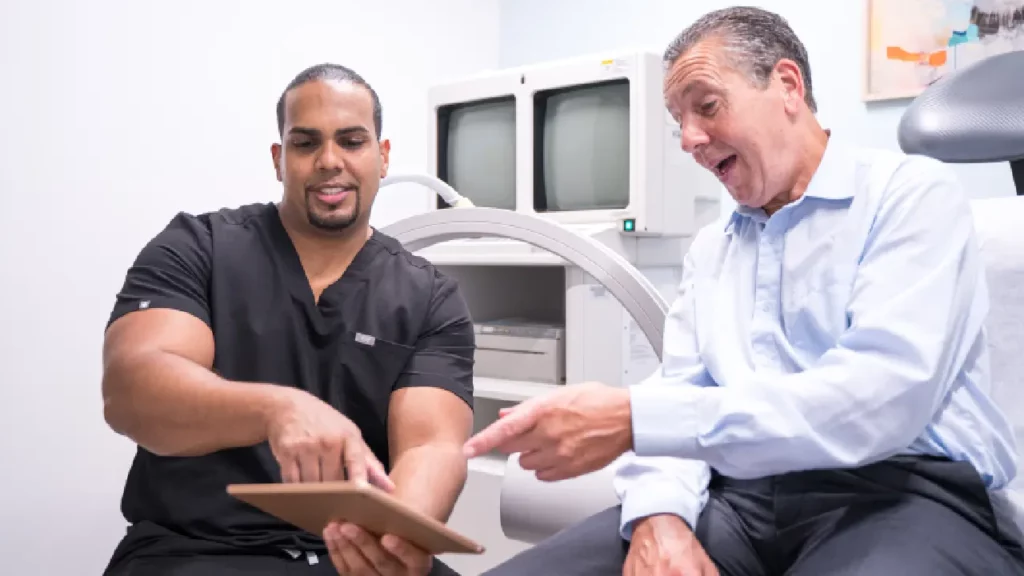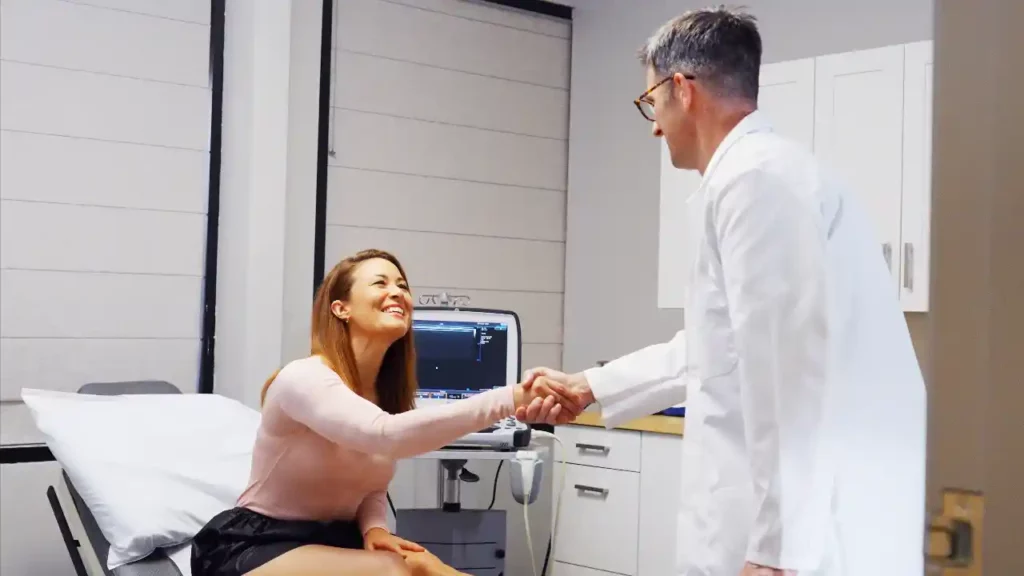Does Insurance Cover Varicose Vein Treatment? Find Out!
When you notice painful, swollen veins or visible blue and red lines tracing up your legs, you might wonder if vein treatment is necessary—or if it’s even covered by insurance. For many people, varicose veins and spider veins aren’t just a cosmetic issue; they can be a sign of an underlying medical condition that requires attention. But as you start exploring vein treatment options, you might be concerned about the cost and whether insurance will cover it.
At Vein Treatment, we’re here to help you understand what’s covered and why. Our experienced vein doctors provide state-of-the-art, minimally invasive vein treatments that are often covered by insurance when deemed medically necessary. With locations across New York, New Jersey, Long Island, California, and Washington, D.C., our board-certified vein specialists can diagnose the cause of your symptoms and offer tailored minimally invasive vein treatments.
Contact us to request insurance verification and find out more about how insurance can help cover your minimally invasive varicose vein treatments.
Does Insurance Cover Varicose Vein Treatment? Yes!
For most patients with varicose veins, insurance can cover the treatment as long as it’s deemed “medically necessary.” This means your insurance may cover treatments if your varicose veins lead to symptoms like swelling, pain, leg heaviness, or skin changes. Venous insufficiency, the condition causing most varicose veins, is typically the root cause your vein specialist will diagnose. If venous insufficiency is confirmed through a diagnostic ultrasound, your insurance will likely approve coverage for treatment, as this is no longer considered cosmetic.
If you’re only dealing with spider veins and no symptoms or signs of chronic venous insufficiency, your insurance may label it as a cosmetic issue. However, if spider veins are linked to an underlying vein issue, they could be covered, too.
Factors that Determine Insurance Coverage for Vein Treatment
When it comes to insurance coverage for varicose vein treatments, several factors are taken into account:
1. Whether There’s Underlying Venous Insufficiency
- Diagnosis of venous insufficiency confirmed through a duplex ultrasound
- Common signs of venous insufficiency like pain, swelling, heaviness, or leg cramps
- Visible skin changes in areas affected by varicose veins
2. The Type of Vein Treatment
The specific vein treatment you and your vein specialist choose will affect your insurance coverage. Most insurance providers cover minimally invasive vein treatments that are medically necessary. Common covered minimally invasive vein treatments include:
- Endovenous laser ablation
- Radiofrequency ablation
- VenaSeal
- Sclerotherapy (if linked to venous insufficiency)
3. Previous Vein Treatments and Results
If you’ve already tried conservative treatments like compression stockings or lifestyle modifications without improvement, insurance companies may be more likely to cover minimally invasive vein treatments. Many insurers require proof that conservative measures weren’t effective before approving treatment for varicose veins.
Insurance Covers Most Minimally Invasive Vein Treatments
Minimally invasive vein treatments are highly effective and can often be performed in outpatient settings, providing relief from symptoms with minimal recovery time. Here are some common vein treatments covered by insurance when deemed medically necessary:
Endovenous Laser Ablation (EVLA)
- A laser fiber is inserted through a small incision to heat and close the problematic vein
- Effective for moderate to severe varicose veins caused by venous insufficiency
- Covered by insurance when linked to medically necessary conditions
Radiofrequency Ablation (RFA)
- Uses radiofrequency energy to seal the affected vein, redirecting blood flow to healthier veins
- Minimally invasive with local anesthesia
- Often covered if there’s underlying venous insufficiency
VenaSeal
- Involves sealing the problematic vein with a medical adhesive
- Particularly effective and comfortable for patients with venous insufficiency
- May be covered by insurance for medically necessary cases
Sclerotherapy
- A chemical solution is injected into smaller varicose veins and spider veins to close them
- Commonly used for spider veins; covered if linked to chronic venous insufficiency
- Not typically covered for purely cosmetic spider veins
Why Minimally Invasive Vein Treatments are Better Than Surgery
Minimally invasive varicose vein treatments are better than varicose veins surgery for these reasons:
- Less recovery time
- Minimal scarring
- Lower risk of complications
- No need for general anesthesia
- Performed as outpatient procedures
- Highly effective with lasting results
- Covered by most insurance plans when medically necessary
FAQs
What is venous insufficiency, and why does it affect insurance coverage?
What is venous insufficiency? Chronic venous insufficiency is a condition where vein valves don’t function properly, causing blood to pool in the veins. It’s often the root cause of varicose veins and is considered a medical condition. If diagnosed, treatments like EVL and RFA are usually covered by insurance.
Spider veins vs. varicose veins: what’s the difference?
Spider veins vs. varicose veins: what’s the difference? Spider veins are small, thin veins that appear close to the skin’s surface, often in red, blue, or purple hues. They are usually harmless and primarily (though not always) a cosmetic concern. Varicose veins, on the other hand, are larger, bulging veins that can cause pain, swelling, and other symptoms due to underlying venous insufficiency and are always a medical concern.
How to remove spider veins?
How to remove spider veins? Spider veins can be treated with sclerotherapy. Insurance typically covers spider vein treatment or sclerotherapy if venous insufficiency is also diagnosed. If spider veins are purely cosmetic, treatment may not be covered.
How to treat varicose veins?
How to treat varicose veins? Treatment for varicose veins includes minimally invasive options like EVLA, RFA, and VenaSeal. These minimally invasive varicose vein treatments close off the problematic vein, relieving symptoms. Insurance usually covers these options if the treatment is medically necessary.
How much does sclerotherapy cost? Is sclerotherapy covered by insurance?
How much does sclerotherapy cost? Is sclerotherapy covered by insurance? Sclerotherapy cost varies based on the extent of the treatment area and the location. If linked to venous insufficiency, insurance may cover the cost. For purely cosmetic cases, you’ll typically need to pay out of pocket.
What is the best treatment for varicose veins?
What is the best treatment for varicose veins? Minimally invasive treatments like EVLA and RFA are considered the best options for varicose veins, offering long-lasting results with minimal downtime. A vein specialist can determine the best option for you based on your specific case.
How to prevent varicose veins?
How to prevent varicose veins? To help prevent varicose veins:
- Maintain a healthy weight to reduce vein pressure
- Exercise regularly to improve circulation
- Avoid long periods of sitting or standing
- Elevate your legs when resting
- Wear compression stockings if recommended
- Avoid tight clothing around the legs and waist
Can I visit any vein clinic, or does insurance require specific providers?
Most insurance plans cover treatments at a certified vein center with board-certified vein doctors. Learn about our vein clinics across New York, New Jersey, California, and beyond, where we work with your insurance to ensure you receive the care you need.
Visit Your Nearest Vein Treatment Clinic
Are you looking for a vein treatment clinic? If you’re struggling with varicose veins or spider veins, minimally invasive vein treatment is often more accessible than you might think. At Vein Treatment, we offer insurance verification before your first appointment so you can proceed with peace of mind.









